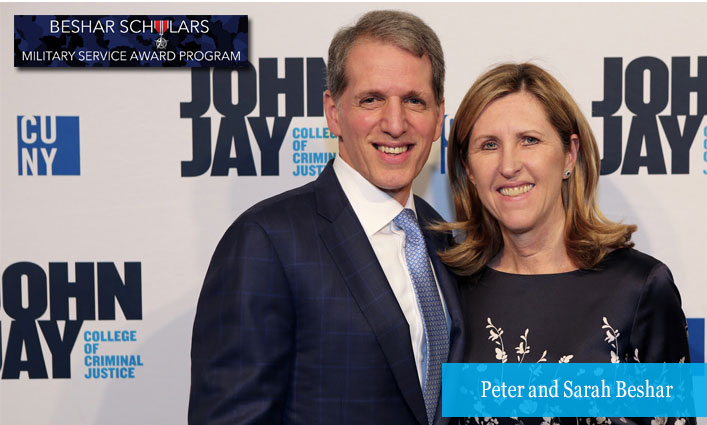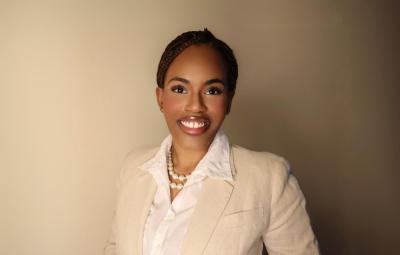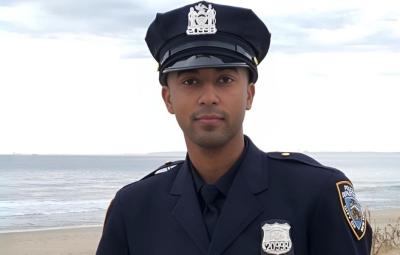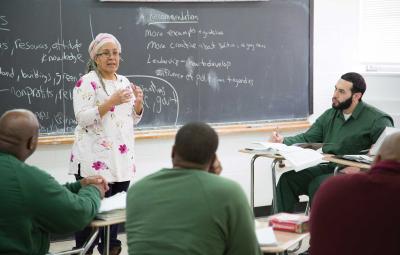
Since its inception, John Jay College has proudly educated students who have served in the Armed Forces. Two of the staunchest advocates for supporting our military and veteran students are Peter and Sarah Beshar, the generous donors behind the newly created Beshar Scholars Military Service Award.
Peter, the Executive Vice President and General Counsel of the Marsh & McLennan Companies, also serves as a Trustee and Chair of the Veterans’ Committee of John Jay College. His admiration for members of the military significantly deepened when the Honorable Cyrus Vance, the former U.S. Secretary of State, asked Peter to serve as his Special Assistant in connection with the United Nations’ effort to bring peace to the former Yugoslavia. “It was my first exposure to the military,” says Peter. “I was so impressed with the bravery and discipline of these soldiers.”
Sarah Beshar, who serves on the Board of Directors of Invesco, has a background in education and comes from a family that championed education. “I benefited personally from scholarships and want to pay it forward,” says Sarah, whose mother was the long-time headmistress of a school of more than 1,000 girls in Australia.
We sat down with the Beshars to learn more about the Beshar Scholars Military Service Award.
Peter, it sounds like your work in the Balkans was truly impactful for you. Can you tell us a little more about that experience?
Peter: I was a young man at the time and this was my first exposure to members of the Armed Forces. The UN peacekeepers stationed in Bosnia came from countries around the globe—Britain, France, Egypt, Russia. It was a dark time in the region—the era of ethnic cleansing with brutal assaults on unarmed civilians. Standing in between the warring factions were these extraordinarily brave troops who grappled with challenging rules of engagement—for example, only being allowed to fire their weapon if fired upon. These soldiers were marvels of courage, decency, and discipline.
“Standing between the warring factions were these extraordinarily brave troops who grappled with challenging rules of engagement. These soldiers were marvels of courage, decency, and discipline, and I was just taken with them.” —Peter Beshar
Are there any other military interactions that particularly stay with you?
Peter: More than a decade later, I had the opportunity to attend the National Security Seminar at the U.S. Army War College in Carlisle, Pennsylvania. Each year, the Army invites 100 civilians to join senior members of the military—typically Colonels—as they complete a nine-month course in strategy, leadership, and military history. I was assigned to a “full bird” Colonel [the insignia for a full Colonel is an eagle] in the Air Force. He was seated directly behind me for the opening session. Just as the program began, he leaned in and said, “I’ve got your six.” I had never heard the expression before, but it doesn’t take a rocket scientist to figure out what it means: He’s at 6:00 o’clock behind me, he’s got my back. I thought it was such a powerful metaphor. Now, when I think of our men and women in the Armed Forces—those who have served in Iraq, Afghanistan and elsewhere—I remember that phrase, “I’ve got your six.” When our veterans return home, having served their country with distinction, isn’t it the right thing for us to now have their back?
“When our veterans return home, having served their country with distinction, isn’t it the right thing for us to now have their back?” —Peter Beshar
Sarah, when Peter was away in Croatia and Bosnia, did you find yourself relating to what military families experience?
Sarah: Not quite, because he was more on the negotiating side, but I think that military spouses have a very difficult role to play. But, when Peter was gone, I was left alone with a newborn baby. She was all of ten weeks old. Maybe there was a little bit of understanding of what military families go through.
“I benefitted personally from a scholarship and want to pay it forward.” —Sarah Beshar
When you speak to John Jay’s military and veteran students, what strikes you the most about them?
Peter: Many people have the perception that college means you graduate in four years, but for our veterans, who are often working at the same time and caring for family members, the path is not a simple one. When you talk to John Jay veterans, you’re struck by how mature and grounded they are. Given all that they have experienced, calling them a “student” is almost a misnomer. They also have skills that don’t always fit neatly on a resume. One aspect that stands out is members of the military will often be quite understated in describing their responsibilities and qualifications. Once you get them to open up a bit, they will say things like: “I organized the logistics for delivering massive amounts of equipment into a war zone in Afghanistan or Iraq.” Then you start to realize the project management skills, the leadership skills, and the communication skills that these talented individuals have.
“When you talk to John Jay veterans, you’re struck by how mature and grounded they are.” —Peter Beshar
At John Jay, you’ve led many of the veteran program initiatives. Can you tell us how that all began?
Peter: When I first joined the John Jay Board of Trustees almost a decade ago, I told the President of the College at the time, Jeremy Travis, and Board Chairman Jules Kroll, that I wanted to focus on our student veterans. When we set up the Veterans Committee and started coming up with programs, the big question was: What could we do to help veteran students transition to civilian life? We invited General David Petraeus to come speak to our student veterans. Wow, did they come to attention when he walked into the room. Ram rod posture.
General Petraeus spoke about how hard it is to take off your uniform: “That uniform in many ways defined who you are.” He pointed to his left shoulder and said, “It tells you who you are. Your right shoulder tells you where you’ve served. And the medals on your chest signify what you’ve done.”
“When we set up the Veterans Committee and started coming up with programs. The big question was: What could we do to help veteran students transition to civilian life?” —Peter Beshar
One of the initial programs we sponsored were fellowships, getting these students placed at a large company or a non-profit in New York City. These fellowships give student veterans the exposure to what they might actually do after graduating. At John Jay, Richard Pusateri [the Military & Veteran Services Manager] does an amazing job of organizing the students and helping them plan for careers after John Jay.
You’ve made a point of helping veterans find employment opportunities and you’ve welcomed them into your organizations. When it comes to working with veterans in the private sector, what have you noticed?
Peter: For veterans, mission is at the core of their being. They’re always asking: What is the mission? What is the collective goal that we are trying to accomplish? It is always team first.
After John Jay was named the number three Most-Military Friendly University in the entire U.S., I briefed our CEO at Marsh & McLennan, Dan Glaser, about the work we had been doing. Without missing a beat, he responded: “You know what we’re going to do? We’re going to commit to hiring 500 veterans in the U.S. in the next three years and you’re going to help run the program.” I gulped and walked out of the room. After conferring with our Chief Human Resources Officer, Laurie Ledford, we hired a head of military affairs and began the journey. Every one of our businesses embraced the effort. It took a ton of work, but we hired more than 500 veterans in the span of three years… and three months!
“For veterans, mission is at the core of their being.” —Peter Beshar
More recently, we developed a program at Marsh & McLennan called “Military Mondays.” Bolstered with what we learned at John Jay, we brought together lawyers and other volunteers from Starbucks, Skadden Arps, and Goldman Sachs to help veterans qualify for social security, disability, and housing benefits from the Veterans Administration.
The program has grown by leaps and bounds. We now meet on the first Monday of every month at the VA Hospital on 23rd Street. With help of in-house lawyers at Barclays, BNY Mellon, Estee Lauder, HSBC, Pfizer, and Morgan Stanley, and the indefatigable General Loree Sutton, who led the Mayor’s Veterans Agency, we have now provided advice to over 500 veterans. As they say in the Army, “Hooah!”
Sarah: And we’re not just helping veterans, we’re also helping their families. In my family, my father, Ron, served in the British Army as a military officer in the 1950s.
Those were hard times for my parents. So, it’s really the entire community—public and private—coming together to support veterans.
Peter, listening to you, I almost get the feeling that you wished you could have experienced “military life.” Did you ever wish that you had served in the military?
Peter: I have very few regrets in my life. One is that I didn’t serve my country in the Armed Forces.
“I have very few regrets in my life. One is that I didn’t serve my country in the Armed Forces.” —Peter Beshar
What is your biggest hope for the 10 recipients of the Beshar Scholars Military Service Award?
Sarah: Back in April, when the idea of this scholarship was coming together, we thought about John Jay students living in New York City during this pandemic. Unemployment soaring. Small businesses closing. Quite apart from the health crisis, the economic distress is palpable. We wanted to help ease the path forward for students during this time. It’s our hope that John Jay military and veterans students are able to complete their degrees and enjoy the journey along the way. After they graduate, we know that they will go out into the world and use their John Jay degree as a springboard to continue their service in the community.
“We hope this support lets student veterans feel seen and understand that there are people rooting for them, because we and so many others are doing just that.” —Peter Beshar
Peter: From the moment that President Mason arrived on campus, she has been focused on student success—specifically, she wanted to increase four and six-year graduation rates at John Jay. She has driven tangible increases through several interventions and programs. If this scholarship can help students stay at John Jay and complete their journey to get a college degree, that’s wonderful. We hope this support lets student veterans feel seen and understand that there are people rooting for them, because we and so many others are doing just that.
- Thomas Donaldson ’21 Exemplifies How Relevant and Valuable Veterans’ Skills Truly Are
- PFC Lorraine Gonzalez ’23 Proudly Follows in Her Father’s Military Footsteps
- SPC Eric Bardales ’21 Sets His Sights on Becoming a Federal Law Enforcement Officer
- Retired U.S. Army Major Michael H. Isom ’22 Aims to Help Alaskan Native Communities
- Shanna-Kay Irving ’22 Provides Support to First Responders, Health Care Workers, Service Members, and At-Risk Youth
- Private Second Class Karina Mejia ’23 Overcomes Financial Hurdles to Pursue Her M.P.A.



